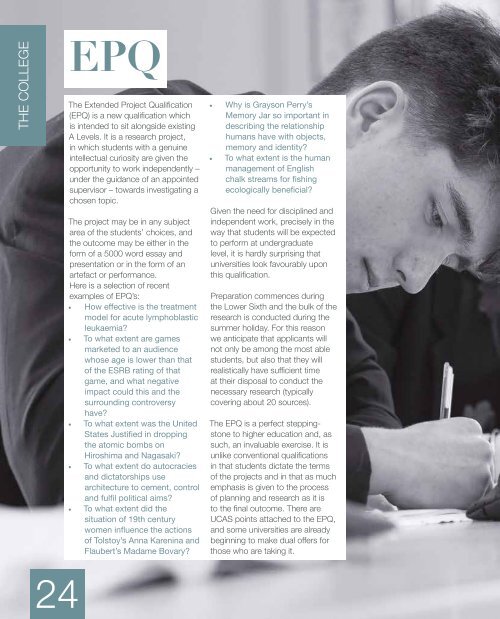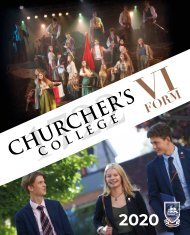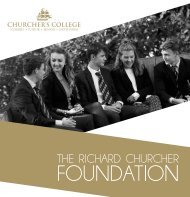Churcher's College Sixth Form Prospectus 2018
Our Sixth Form Prospectus provides course details, an insight into life as a Sixth Former at Churcher's, testimonials from students as well as the universities and types of careers they go on to do in the world of work.
Our Sixth Form Prospectus provides course details, an insight into life as a Sixth Former at Churcher's, testimonials from students as well as the universities and types of careers they go on to do in the world of work.
You also want an ePaper? Increase the reach of your titles
YUMPU automatically turns print PDFs into web optimized ePapers that Google loves.
THE COLLEGE<br />
24<br />
EPQ<br />
The Extended Project Qualification<br />
(EPQ) is a new qualification which<br />
is intended to sit alongside existing<br />
A Levels. It is a research project,<br />
in which students with a genuine<br />
intellectual curiosity are given the<br />
opportunity to work independently –<br />
under the guidance of an appointed<br />
supervisor – towards investigating a<br />
chosen topic.<br />
The project may be in any subject<br />
area of the students’ choices, and<br />
the outcome may be either in the<br />
form of a 5000 word essay and<br />
presentation or in the form of an<br />
artefact or performance.<br />
Here is a selection of recent<br />
examples of EPQ’s:<br />
• How effective is the treatment<br />
model for acute lymphoblastic<br />
leukaemia?<br />
• To what extent are games<br />
marketed to an audience<br />
whose age is lower than that<br />
of the ESRB rating of that<br />
game, and what negative<br />
impact could this and the<br />
surrounding controversy<br />
have?<br />
• To what extent was the United<br />
States Justified in dropping<br />
the atomic bombs on<br />
Hiroshima and Nagasaki?<br />
• To what extent do autocracies<br />
and dictatorships use<br />
architecture to cement, control<br />
and fulfil political aims?<br />
• To what extent did the<br />
situation of 19th century<br />
women influence the actions<br />
of Tolstoy’s Anna Karenina and<br />
Flaubert’s Madame Bovary?<br />
• Why is Grayson Perry’s<br />
Memory Jar so important in<br />
describing the relationship<br />
humans have with objects,<br />
memory and identity?<br />
• To what extent is the human<br />
management of English<br />
chalk streams for fishing<br />
ecologically beneficial?<br />
Given the need for disciplined and<br />
independent work, precisely in the<br />
way that students will be expected<br />
to perform at undergraduate<br />
level, it is hardly surprising that<br />
universities look favourably upon<br />
this qualification.<br />
Preparation commences during<br />
the Lower <strong>Sixth</strong> and the bulk of the<br />
research is conducted during the<br />
summer holiday. For this reason<br />
we anticipate that applicants will<br />
not only be among the most able<br />
students, but also that they will<br />
realistically have sufficient time<br />
at their disposal to conduct the<br />
necessary research (typically<br />
covering about 20 sources).<br />
The EPQ is a perfect steppingstone<br />
to higher education and, as<br />
such, an invaluable exercise. It is<br />
unlike conventional qualifications<br />
in that students dictate the terms<br />
of the projects and in that as much<br />
emphasis is given to the process<br />
of planning and research as it is<br />
to the final outcome. There are<br />
UCAS points attached to the EPQ,<br />
and some universities are already<br />
beginning to make dual offers for<br />
those who are taking it.







